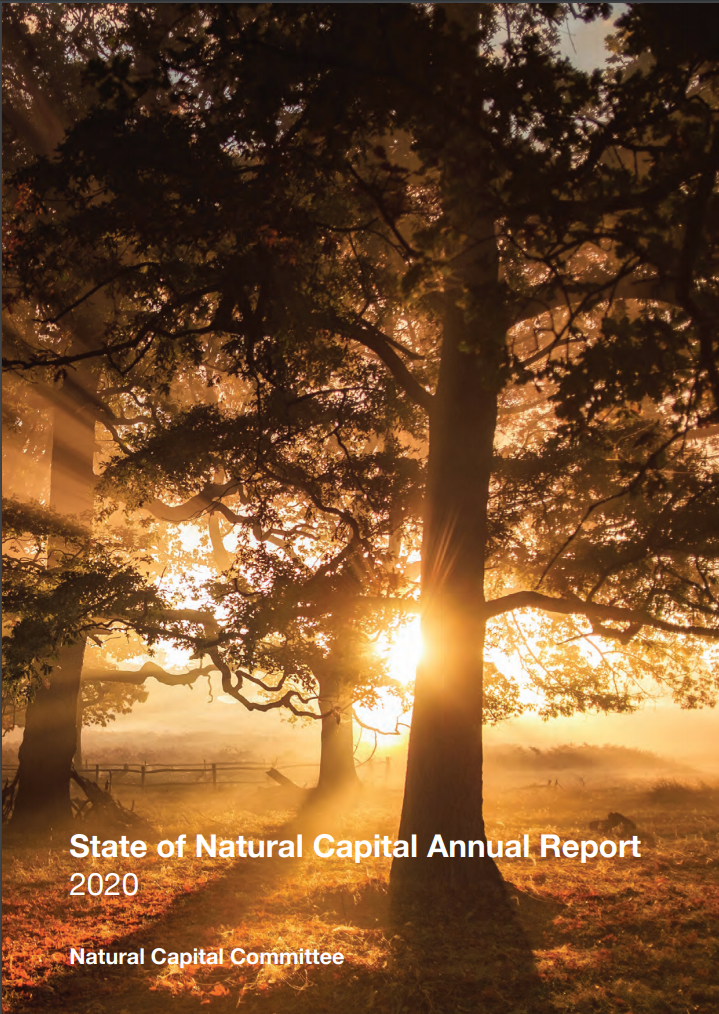Story
Natural Capital Committee launches annual report
04 February 2020
The Natural Capital Committee has launched its 2020 Annual Report today, including contribution from member Prof. Melanie Austen of Plymouth Marine Laboratory. The Report reviews the progress made towards the UK Government’s 25 Year Environment Plan and commitment “to be the first generation to leave the environment in a better state than it inherited.”

In 2011 the government published the White Paper: The Natural Choice, which was the first of its kind for over 20 years. In response, the Natural Capital Committee proposed a 25 year plan for environmental improvement to help achieve the ambitions set out within the paper and in 2018, the 25 Year Environment Plan (25 YEP) was launched by the government, following further advice from the Natural Capital Committee. It is proposed that this will be incorporated into the Government’s new Environment Bill currently progressing through Parliament.
The 2020 report, which was launched at the Royal Society today with Ministers Rebecca Pow MP and The Rt Hon Zac Goldsmith, states that: “The absence of progress since 2011 is more notable than the successes. Broadly the natural environment is deteriorating,” and recommends an urgent and comprehensive natural capital baseline census so that progress can be assessed robustly.
The main recommendations from the Natural Capital Committee 2020 Annual Report are:
• The Environment Bill should include a general duty to protect and enhance the natural environment, with legally binding interim and long term targets for each of the ten 25 YEP goals.
• The Environment Bill should explicitly cover key marine natural capital, such as the seabed, with targets for fisheries extraction set within the framework of the overarching targets of the Environment Bill rather than the Fisheries Bill.
• The Office for Environmental Protection’s scope should be expanded to cover environmental law related to private companies and landowners. It is also critical that this Office has the independence, resources and authority to hold the government and its agencies to account for environmental degradation
• Three principles should be at the heart of environmental legislation: public money for public goods; the polluter pays, and net environmental gain.
• The NCC stated in its sixth Annual Report (2019) that “there is a case to be made for incorporating all aspects of environmental protection at a national level within one body. This would entail substantial changes to the existing bodies.” It is therefore extremely disappointing that the current Environment Bill does not address this issue.
• The Government’s new Agriculture and Fisheries Bills should put the public money for public goods principle at the heart of spending decisions and clearly define public goods, noting that these exclude food production. The Fisheries Bill should be explicit about minimising impacts on marine natural capital.
• Government should urgently work towards replacing biodiversity net gain with marine and terrestrial environmental net gain in the Environment Bill.
• The Government’s net zero target should be viewed in the broader context of the 25 YEP goals and be delivered through a joined-up Government response to climate change.
• Any nature based interventions for delivering net zero should take a natural capital approach, incorporating the multiple goals of the 25 YEP as part of a joined up Government response to climate change.
• A comprehensive, England-wide environmental census of the stock of natural capital assets is urgently needed.
The Natural Capital Committee is an independent advisory Committee, providing advice to the Government on the sustainable use of natural capital, or in other words, natural assets of economic and social importance, such as land, forests, rivers, minerals and the ocean. The remit of the Committee also covers the benefits we derive from the natural environment, including food, recreation, climate regulation and clean water.
The Committee is chaired by Professor Dieter Helm of the University of Oxford and consists a total of seven members who bring world-class expertise in economics, ecology, environmental science and business. Prof. Melanie Austen, Head of the Sea &Society Science Area at PML, has been a member of the Committee since 2018 and contributes a wealth of marine expertise, particularly relating to the policy relevance and societal consequences of changes to the marine environment.
Prof. Austen commented: “In this report the Natural Capital Committee have continued to emphasise the importance of ensuring that marine environment and its wealth of biodiversity and ecosystem functioning – its natural capital – which contribute so much of societal importance and economic value to England, is considered by the government in both its environmental and its fisheries legislation and in its policy. The same principles that apply to environmental management on land should equally apply to environmental and resource management, and infrastructure and other developments at sea and on the coast.”
